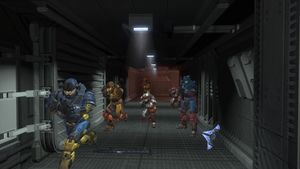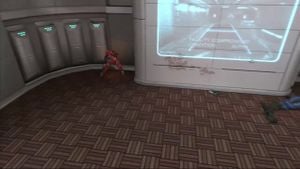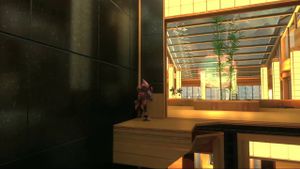Camping
From Halopedia, the Halo wiki

- Red zealot: "You fuckin' camping bitch!"
- Blue zealot: "It's a legitimate strategy!"
- — From Red vs. Blue's The Best Laid Plans[1]
Camping is the act of voluntarily keeping out of firefights by staying in one place. The act of camping is generally frowned upon in the gaming community and often considered a newb tactic. Players who employ this voluntary act would be referred simply as "campers".
Overview
Campers typically hide in areas that are easily defended or where they are unlikely to be noticed, while shooting from a distance or sneaking out from behind a corner to wreak havoc on an unsuspecting player passing by. They typically lie in wait with powerful weapons; depending on their strategy, they may use ranged weapons like the Sniper Rifle, Rocket Launcher or Battle Rifle; or close-quarters weapons, like the Mauler, Gravity Hammer, Energy Sword, or Shotgun.
Some campers hide where they would not be noticed, using their stealth to snipe unaware players without being detected or counter-attacked. Others use guerilla tactics, hiding around corners or on ledges, and waiting to ambush passing players. Still others will wait in a small, easily-defended area—often an area with a single entrance that acts as a choke point, allowing the camper to decimate any forces that try to retaliate.
While some instances of camping are dependent on stealth, other campers—often those that camp in easily-defended areas—will happily announce their position with Spartan Laser blasts and by grenade spamming. Campers that depend on stealth will rarely camp with an objective, such as the Oddball or a flag, as said items are marked with waypoints.
Although camping is a legal and legitimate strategy, and may actually be encouraged by certain survival-oriented game types (such as variants of Infection), most players complain that it takes away from the inherent fun of the game. It is often stated that it is a "noob" strategy, as it allegedly takes little "skill" and is a cowardly way to play. Though this is not always necessarily true, most players frown upon this strategy.
On occasion, however, camping can be vital in cooperative multiplayer modes, such as in Halo 3: ODST's Firefight mode. In Firefight, the player may rely on higher difficulties to camp and take out enemies quickly rather than lose precious lives. Although some people still frown upon the tactic, even though in ODST, it cannot be used against other players.
Strategy and counter-strategy
Corner camping

Many campers rely largely on close-quarters ambushes, or "corner rushing", to take down their enemies. Popular places to corner-camp are sharp, blind corners, where a camper may hide with a powerful short-range weapon (such as the Gravity Hammer, Energy Sword, or Shotgun) and cut down anybody who turns the corner. Once a corner-camper's location has been determined, however, it is generally quite easy to take him out. The usual strategy for these situations is to throw a grenade into his hiding spot to kill him or at least flush him out. With the advent of Halo 3's Mauler, which spawned rapidly and commonly on numerous multiplayer maps, corner-camping became a severe balance issue, so much so that Bungie drastically decreased the number of Maulers in multiplayer.
Room camping
In certain game modes, such as Infection, players often camp together in a close room with only one point of entrance. In Infection games, this makes it difficult for Zombies to get to the humans, as they are usually shot at by multiple players at once. Such spots include the lift zone in Sword Base. A counter-strategy for Zombies is to rush in a large group. The Zombies in the front will usually die, but if the Zombies behind are fast enough, they can kill some of the humans while they are pumping their shotguns or reloading from the last kill. Although the Zombie hoard will usually die, this will thin out the humans in a camping spot, so repeating this will eventually drive out or infect all the humans.
Target camping
In objective games, such as Assault, King of the Hill, and Capture the Flag, it is relatively common practice for a player to hide out of sight near the objective and target anybody who attempts to claim or defend the objective. Unlike most other forms of camping, this is not generally frowned upon, and is indeed rather commonplace. Nonetheless, like all forms of camping, it is potentially an unsporting strategy.
Weapon camping is a form of target camping that is especially prevalent on smaller maps. Campers may hide near a powerful weapon, killing anyone who arrives to take it. This became a major focus of the Halo 3 multiplayer map Snowbound; players would hide near the Shotgun spawn and slaughter all the myriad enemies who attempted to claim it. This became more important than anything else on the map, so much so that Bungie removed the Shotgun from Snowbound and replaced it with a Beam Rifle.
This has also taken place on the map The Pit, where the Energy Sword spawn is to the side of the map. The small room where the Energy Sword spawns is ideal for camping, since to either side of the entrance, there are sharp corners, where campers can lie in wait and attempt assassinations or noob combo kills with a Mauler.
Spawn camping
Spawn camping is a tactic in which a player locates a series of Respawn Points inside of a specific map. The player will, during gameplay, camp with a power weapon in a position where they can kill opponents the moment they respawn. The victims of such a tactic are caught unprepared, ill-equipped and possessing only the default weapons, which are often no match for the powerful weapons wielded by the camper. Determined spawn campers that use a Sniper Rifle may even be able to headshot a victim within seconds of their respawning.
The act of camping at a Respawn Point is spawn camping; the act of actually killing players that respawn at the point is spawnkilling.
This became unfortunately common in Halo 2's matchmaking, especially on smaller, symmetrical maps, such as Midship and Sanctuary. In Halo 3, the issue of spawn camping was addressed specifically by multiplayer designers, who engineered a complex algorithm to govern respawns. This algorithm not only assured that respawns would take place in a helpful manner, but also reduced the likelihood of respawning at a location with enemies nearby. Although spawn camping remains an issue to some extent, it is far less common.
Another type of spawn camping is to drive a vehicle rapidly around your enemy's base. Although this tactic will allow many players to escape their spawn points unharmed, it will also grant the player a considerable number of kills as they simply splatter newly-spawned foes. This is not generally considered a serious form of camping, as it relies on motion and has a considerable level of risk involved. This tactic is especially popular in Halo: Combat Evolved, as even the slightest touch from a moving vehicle will kill an opponent.
Spawn camping may also refer to camping at the spawn locations of weapons, equipment, etc. in order to have a monopoly on the item. For more information on this tactic, see Target Camping, above.
Lift camping
Lift camping is the practice of ambushing and killing players who are in uncontrollable motion. It takes its name from the Gravity lift and other similar lifts that often adorn levels.
Players in a Gravity Lift are unable to control their movement in any way, making them easy targets for campers. On the Halo 2 map Lockout, for example, the Gravity Lift launched players clearly into the open with a loud, recognizable noise in full view of the Sniper Rifle spawn, turning them into easy prey.
This has also become a commonplace tactic in the Halo 3 map Construct, where players will camp at the top of the lifts with the Energy Sword or Flamethrower and lay waste to those ascending through the lift. A well-timed Plasma Grenade can also kill ascending players.
The lift camping strategy can largely be undermined by throwing a grenade or Power Drain into a lift before you enter it, although this is admittedly not always practical. The best counter is often to take a different route up and flank the camper, as they are often unprepared for attacks from the side or back. Such campers often utilize close-range weapons, an effective strategy in Lockout.
On the Halo: Reach map Reflection, the lift in the area Elevator Shaft is also susceptible to lift camping. The player has to walk towards the platform and often has to wait for the next ride up. In this time an enemy player can sneak up behind them from a corridor and kill the player, given that the player was not paying attention to his back. Also, at the top of the elevator, there is a small platform to the immediate left on which a player can camp and melee a passenger in the back. Given that most players are looking forward when arriving at the top, the camper is often not seen. To secure the area, before taking the lift, throw a Plasma Grenade from the bottom to the small platform. Luckily, death by camper can be avoided if the player is actively surveying their environment.
Tele-camping
Named for its use of teleporters, tele-camping is usually -- but not always -- performed in an open map that is big enough for a vehicle. The basic strategy is to get a turret (such as the ones found on Warthogs) into a position where it has a view of the end of a teleporter. Ideally, the turret would also be protected from any open fields of fire, such as classic sniping spots and bases. A variant of this method involves waiting behind the turret, so the vehicle does not show up on the motion tracker as an enemy.
The camper then gets in the turret and waits for an enemy to go through the teleporter. As soon as the enemy arrives, the gunner tears the foot soldier to shreds. Another strategy, which is good if there are snipers about, is to drive a vehicle, such as a Warthog or Ghost, to the teleporter, and stay in the driver seat. Such a setup would allow a camper to splatter anyone who uses the teleporter.
The latter method of tele-camping is very popular in Halo PC's map Blood Gulch, as the level is wide open, but the teleporters are fairly concealed. The method does not work in newer games, however, as the vehicle would block the teleporter, preventing its usage.
Etymology
The name "camping" is derived from the real-life recreational activity of the same name. In the same way that outdoor campers set up and occupy a small camp, video game campers wait in a small area instead of venturing out to the battlefield.
Trivia
- A player is likely to resort to camping if they have the Energy Sword or shotgun due to the weapons' fairly short range.
- A player is also likely to resort to camping if they have any sniper weapon and a strategic position on a large map.
- A Halo 3 Slayer variant titled "Duel" has the description "No camping! Free for all but the leader cannot hide." The game has a waypoint enabled to show the leading player in kills. Rendering camping to be a much less effective strategy.
